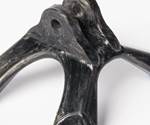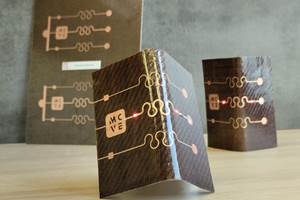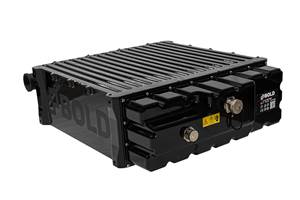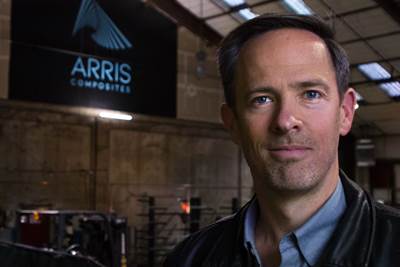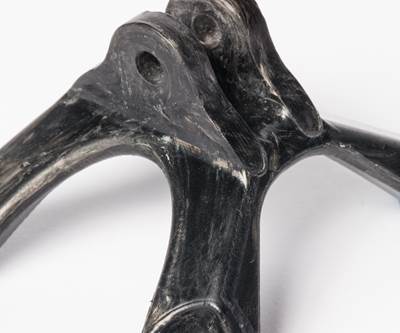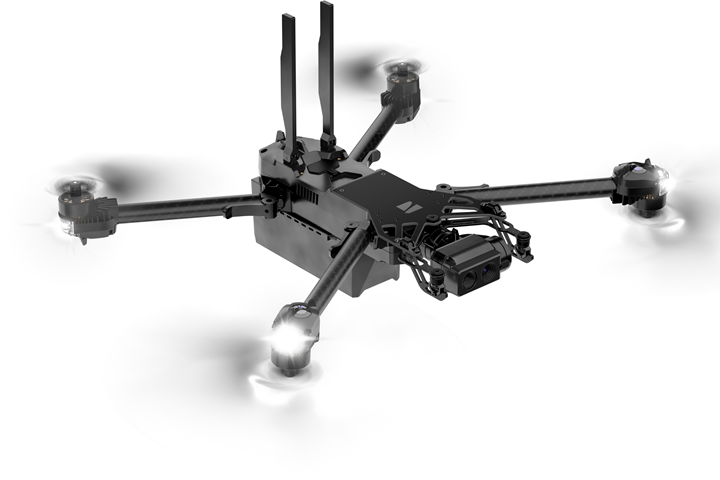
Along with light weight, foldability for easy transport and long flight range, the Skydio X2 autonomous drone features situational awareness, infrared imaging and other advanced skills and software capabilities. Photo Credit | Skydio
Arris’ (Berkeley, Calif., U.S.) Additive Molding technology combines 3D-aligned continuous fiber additive manufacturing with high-speed compression molding for fabrication of high-performance thermoplastic composite parts for a variety of potential end-use applications. Recently, Arris has partnered with drone manufacturer and autonomous flight technology leader Skydio (Redwood City, Calif., U.S.) to redefine drone airframe design using Additive Molding.
The autonomous Skydio X2 drone, said to be lighter and more robust with longer range than the company’s previously launched consumer drones, has been developed for use in industrial, consumer and defense settings. Notably, Skydio X2’s foldable airframe features a single glass and carbon fiber/thermoplastic structural component manufactured using Arris’ Additive Molding process, consolidating the previous model’s 17-part assembly with one multi-functional, multi-material structure. The new design also adds strength and stiffness at a fraction of the weight, enabling the Skydio X2 to reach higher speeds and distances up to six kilometers. For this design, Skydio received the CES 2021 Best of Innovation Award in the Drone and Unmanned Systems category.
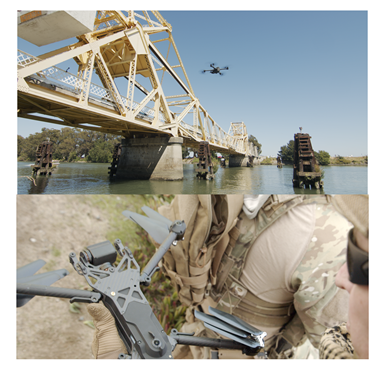
Previous Skydio drones have been consumer-focused. The Skydio X2 is the first industrial model, designed for military missions, asset inspection and more with an expected range of up to six kilometers. Photo Credit | Skydio
Ethan Escowitz, founder and CEO of Arris, explains that the airframe component needed to incorporate a glass fiber composite window for radio signal transparency over the drone’s antenna, but, as the component is also a core structural part of the airframe, carbon fiber was chosen to meet mechanical requirements in a different region of the part.
“Part of the value of Additive Molding is that we can not only align the fibers in any region of a part, but we can also change the material composition within different regions of the same part,” he says. “It is one continuous part from one end to the other, but the material composition transitions to meet functional requirements.”
Escowitz says that in the Additive Molding process, glass and carbon fibers are prepregged with the same thermoplastic resin matrix and then laid up and bonded together under heat and pressure in a final compression molding step. “Even though you transition from glass fiber to carbon fiber, the part has excellent consolidation and a homogeneous matrix, so the parts perform exceptionally and consistently,” he says.
In addition, Arris’ manufacturing method is said to enable aerospace performance in a scalable automated manufacturing solution. “We’re using aerospace methods, but producing parts with high-speed automated molding equipment typical in the consumer product world, where the norm is cost-efficient production with dead-on accuracy and repeatability,” Escowitz says. The use of additive manufacturing also eliminates scrap and associated costs.
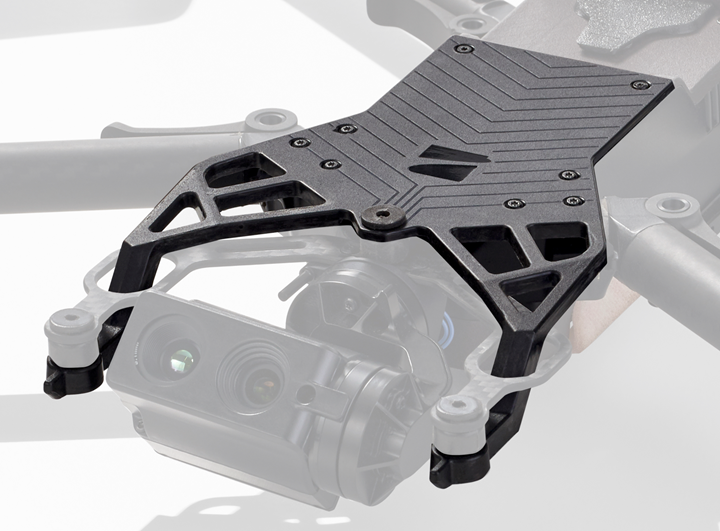
Arris’ Additive Molding process enables low-cost, high-volume production of a structural component that combines glass and carbon fiber into one consolidated component. Photo Credit | Arris
Skydio says the drone is ideal for a range of use cases, including situational awareness, asset inspection, security and patrol. Designed, assembled and supported in the U.S., Skydio X2 is NDAA compliant and has been selected as a trusted unmanned aerial vehicle (UAV) solution for the U.S. Department of Defense as part of the Defense Innovation Unit’s (DIU) Blue sUAS program. According to Skydio, the partnership with Arris further validates Skydio’s commitment to innovation, supply chain security and U.S.-based manufacturing.
Adam Bry, CEO of Skydio, says, “We are excited about the value that our partnership with Arris will bring to our customers. At Skydio, we pursue cutting-edge innovation across all facets of drone technology. The unique properties of Arris’ Additive Molding carbon fiber allows us to optimize the strength, weight and radio signal transparency of the Skydio X2 airframe to deliver a highly reliable solution that meets the needs of demanding enterprise, public safety and defense use cases.”
Escowitz concludes, “The evolution of aerospace design has been punctuated by breakthroughs in manufacturing and materials. Such a moment has come where manufacturing of optimized structures has converged with composite materials ideals to unlock previously impossible, high-performance aerospace designs. While we’re working with leading aerospace manufacturers to improve aircraft performance, sustainability and costs, Skydio’s culture and market have enabled an unsurpassed pace of innovation that has fast-tracked this transformation to deliver the next-generation of aerostructures. It’s simply amazing to see such a revolutionary product broadly available and flying today.”
Related Content
MCVE 3DFlaxtronics enables functional composites for printed electronics
The novel process produces intelligent, highly functional films embedded in flax fiber organosheets with a bio-sourced PA 10-10 resin to advance electronic parts and components development.
Read MoreAviation-specific battery system uses advanced composites to address electric, hybrid flight
BOLDair’s composite enclosure, compression structures and thermal runaway management enables high-performance electric energy storage.
Read MoreTeijin lightweight materials enable VAIO portable displays
Teijin's Tenax TPCL and Panlite Sheet materials allow for the creation of complex, three-dimensional shapes in a single molding step.
Read MoreExel secures design patent extension for pultruded fiberglass radomes
Technique for antenna radomes forms “functional zones” inside composite material, enhancing existing 5G technology performance, application potential.
Read MoreRead Next
Episode 33: Ethan Escowitz, Arris Composites
CW Talks checks in with Ethan Escowitz, co-founder and CEO of Arris Composites, to learn about the Additive Molding technology his company has developed.
Read MoreAdditive Molding promises mass-produced high-performance composites
Arris Composites introduces a patent-pending technology that manufactures high-performance thermoplastic composite components with a combination of additive manufacturing technology and high-speed compression molding. Has mass production of advanced composite components finally arrived?
Read More“Structured air” TPS safeguards composite structures
Powered by an 85% air/15% pure polyimide aerogel, Blueshift’s novel material system protects structures during transient thermal events from -200°C to beyond 2400°C for rockets, battery boxes and more.
Read More

.jpg;width=70;height=70;mode=crop)

